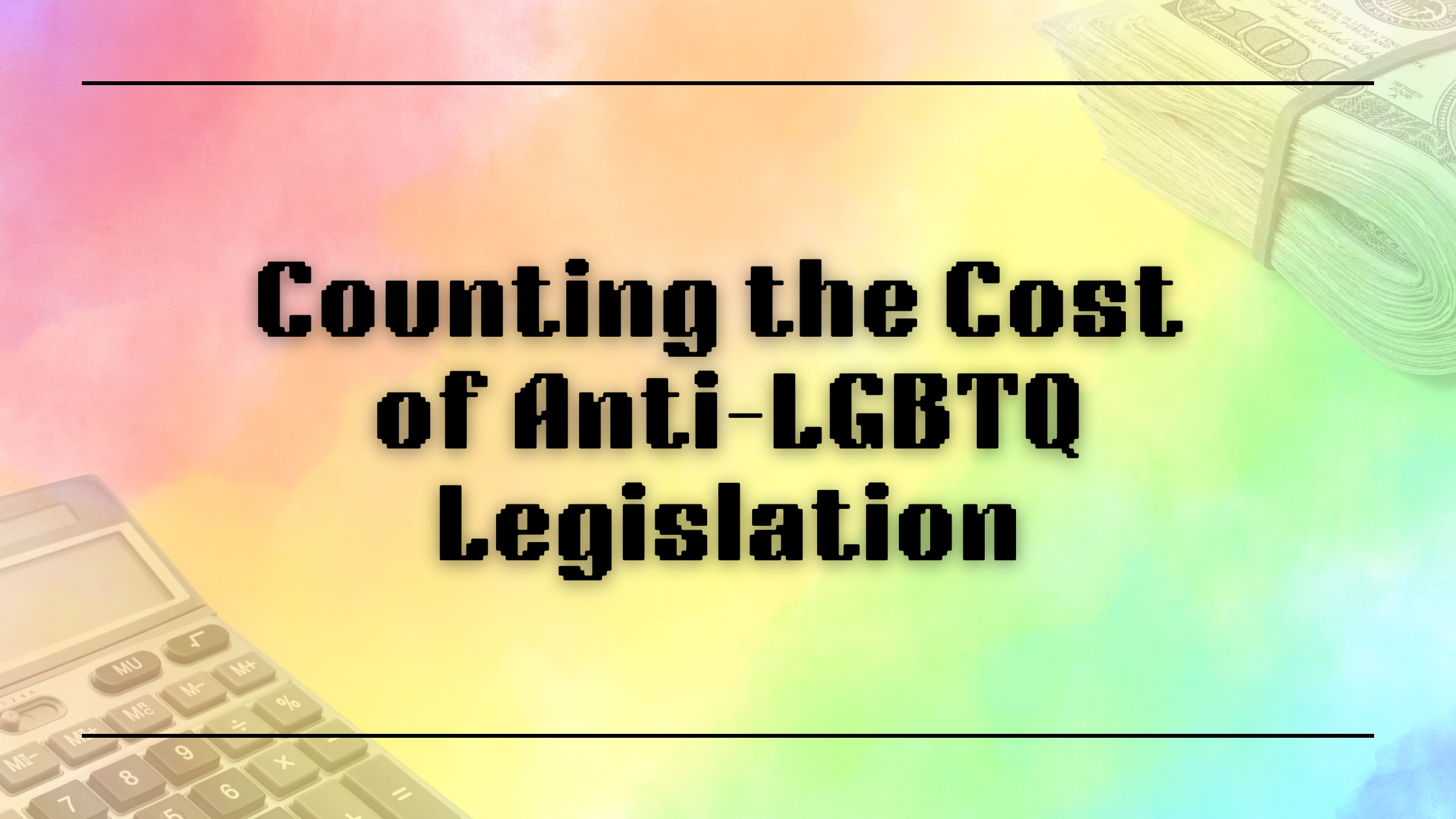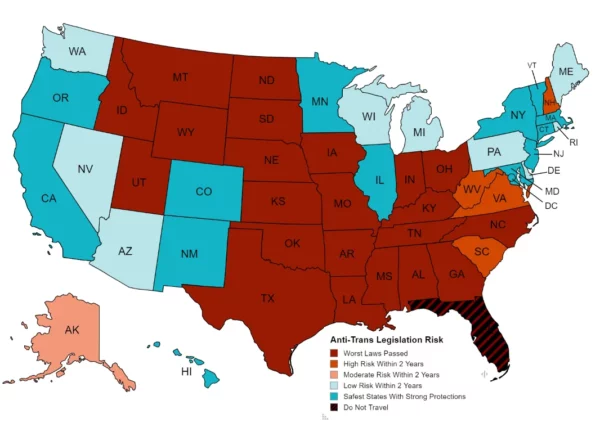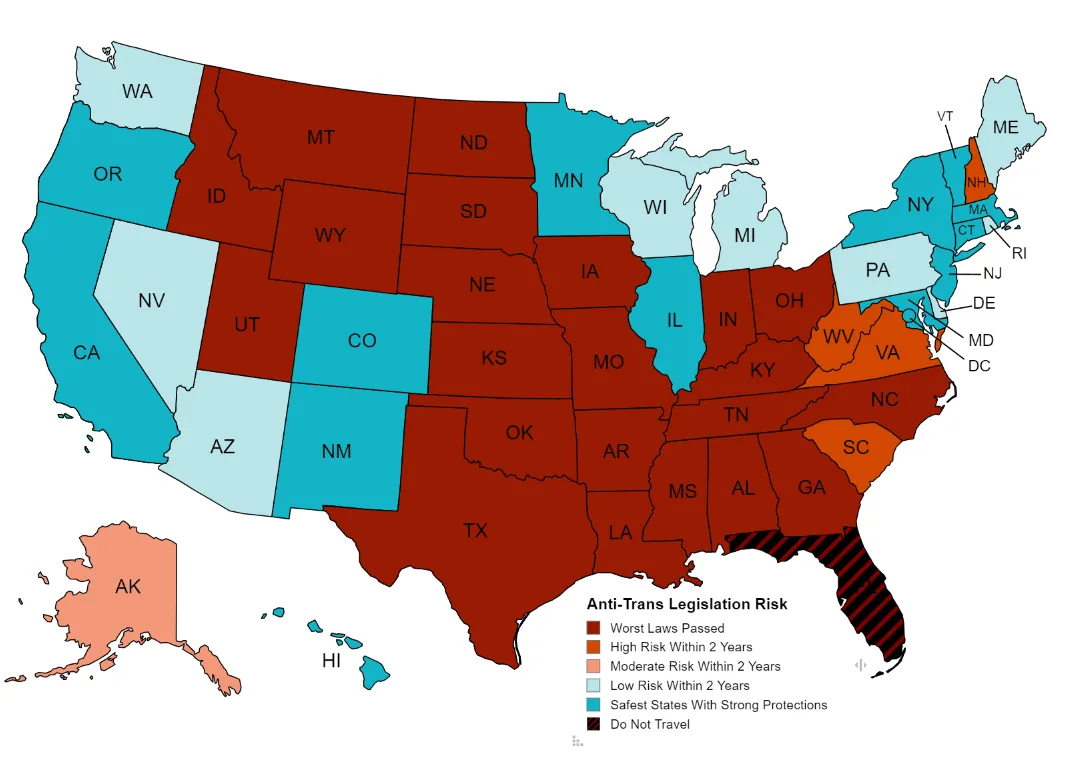
It’s hard to believe that Washington voters approved marriage equality more than a decade ago. It feels like just yesterday that queer folks like finally got the ability to say “I do”. For many of us, it was a significant milestone and offered hope for the future. However, now, just nine years later, the state of civil rights for queer people is more uncertain than we could have imagined.
The rising number of anti-LGBTQ laws states are proposing and passing each year threaten to reverse the progress and advocacy that queer people have worked so hard for. In 2024 alone, 32 state legislatures across the country have introduced or passed laws specifically targeted at LGBTQ youth, families, and workers.
Laws range from bans on drag performers, books, and pride flags to the wholesale closure of DEI departments. Restrictions about what government agencies and schools can or can’t say regarding pronouns, gender identity and sexual orientation seek to limit free speech and the help LGBTQ youth can receive. And many new laws functionally criminalize being trans by barring folks from both seeking and providing gender-affirming care.
These potential laws would, of course, have deep and varying impacts on people’s physical and mental health and safety. They’re designed that way – to destabilize LGBTQ people in general and LQBTQ youth and families in particular. But they will also have impacts beyond the obvious intentions. Whether it’s on a family budget or local and state economies, every one of these anti-LGBTQ laws would have either direct or rippling economic effects.
Laws targeting LGBTQ youth? In this economy?
In 2015, after decades of movement building and activism, marriage equality finally became the law of the land throughout the United States. As a queer person, I remember being both caught up in the elation of the moment and simultaneously feeling an undercurrent of uneasiness.
Marriage equality was important and has economic impacts for families. Laws that create equity in the recognition of queer families are part of fixing the systems that adversely impact the economic security of queer folks. But laws don’t change opinions and the right to get married does not provide blanket protections to workers and citizens.
At that time, I worried then about what sort of backlash was coming from these newly-won rights. Now, nine years later, here we are. Legislatures in over half of the country are considering how to further erode the rights of trans and queer people.
As if there’s nothing more important for them to address.
At a time when Americans are worried about affording groceries and keeping a roof over their heads, conservative lawmakers are more focused on stoking moral panic over drag queens and elementary school bathrooms. Rather than address mounting economic inequality, it has become easier to win elections by scapegoating queer and trans communities. Using LGBTQ identities to fear-monger and pander to their base.
This is exactly the opposite direction we should be going to improve lives and financial stability.
New laws make an old problem worse
Queer and transgender people have long experienced higher rates of poverty and income insecurity. This is due to a myriad of factors that can impact financial well-being and limit potential earnings.
LGBTQ youth risk losing the benefit of financial support from their families once they come out. They experience higher rates of depression and anxiety (often due to societal and familial factors that make being queer in America difficult), which can affect their performance at school and at work. Then, once they’ve graduated or otherwise gone into the workforce, they can experience discrimination on the job. For employees in states where harmful laws are making it increasingly difficult to navigate their healthcare and employment rights, the stress and emotional labor can impact their focus and productivity.
Queer folks also face more barriers to building wealth as a direct result of higher health care costs and reduced lifetime earnings. Out-of-pocket medical costs have an outsized effect on trans people’s finances when gender-affirming medical care and prescriptions are not covered by insurance.
Three types of laws mean a one-two punch
Discriminatory laws that impact queer and trans people don’t only harm individuals and families. They have negative impacts on businesses and local and state economies as well. A lack of inclusive policies can pose a significant challenge when determining where to live, work, and recreate.
The Movement Advancement Project identified three types of anti-LGBT legislation that contribute to economic instability for LGBTQ families and households: Lack of protections against discrimination; lack of or refusal to recognize LGBTQ families; and failure to adequately protect LGBTQ youth and students. These lack of protections at work, in housing, and at school create a cycle of economic insecurity that hits BIPOC members of the community hardest.
As Ineke Mushovic, Executive Director of the Movement Advancement Project wrote, “unfair laws deliver a one-two punch. They both drive poverty within the LGBT community and then hit people when they are down.”
All of which is to say that LGBTQ individuals and families have already been facing dire challenges. The tsunami of harmful anti-trans and LGBTQ proposals and laws are further compounding a problem that already needed fixing.
That isn’t merely an opinion, either. There is ample evidence demonstrating that inclusive policies—those that seek to help, rather than harm, people who are already experiencing inequitable situations—foster a more robust economy.
Tough choices at work and at home
LGBTQ workers are being forced to make tough decisions about where to live and work as a result of the hostile political climate. A recent survey of LGBTQ employees found that 79% of the respondents considered laws regarding LGBTQ people when considering a job in another state. Given that employee turnover is responsible for US businesses losing up to $1 trillion each year, businesses in states where anti-LGBTQ laws are going into effect will likely be impacted.
Meanwhile, families with queer and trans kids are choosing – under duress – to relocate, even if it means moving somewhere with a higher cost of living where their kids can be safe and thrive.
And it’s not just parents considering a move. In a 2023 survey, 27% of LGBTQ adults and 43% of transgender adults said that anti-LGBTQ legislation has forced them to reevaluate where they live. Eight percent had already moved for the same reasons.
Relocating your life in order to find safety and peace isn’t cheap, though. The costs of moving are just one more additional financial burden on LGBTQ households and families.
Adding up the costs for conservative states
With so much Queer-flight from more conservative parts of the country, it’s no surprise that states are feeling the impacts. Discriminatory laws have been shown to drive workers away and potentially keep new people from coming to visit.
North Carolina’s anti-trans bathroom law, HB2, certainly made this point. While it was in effect (it’s since repealed), entertainers, sports leagues, and other businesses actively avoided the state. Their boycott had a quantifiable impact. Similarly, Indianapolis is estimated to have lost $60 million in potential revenue after a religious liberties bill allowed discrimination against LGBTQ people. Over 300 companies have signed on to an open letter opposing these harmful LGBTQ bills, putting these dangerous bills in the limelight.
Wealthy entities aren’t avoiding states with anti-LGBTQ laws out of the goodness of their hearts. They understand the value of diversity, fairness, health, and dignity of their workforce. For many companies and industries, inclusive policies are just smart business.
But what does this have to do with Washington?

The Adult Trans Legislative Risk Assessment Map
At this point, you might be proud. “Washington already has excellent non-discrimination, employment, and health laws in place for queer and trans people,” you’re saying. And you would be correct. Washington has some of the strongest laws in the country when it comes to protections for LGBTQ folks.
Washington has a reputation for being queer-friendly, which carries a lot of weight when people consider big life changes. As a result, we will likely reap the benefits that other states have lost.
These are fundamentally good things. Being viewed as a safe place for queer folks can have a positive impacts on our economy. But that doesn’t mean that we aren’t affected by what’s happening elsewhere. We are not immune from the harm that is spreading. And we need only to look toward the 2024 Legislative session to see the risks we face.
LGBTQ youth put at risk in Washington
This past winter, our Democrat-lead state legislature passed a law created by the right-wing multi-millionaire Brian Heywood. The bill specified that parents would be notified in a variety of situations about their student’s experiences at school. Parents could review curriculum materials, opt their kids out of sex ed, and ask for clarification about classroom activity.

The Youth Trans Legislative Risk Assessment Map
Most of the initiative is redundant. Many of the parental rights presented have already been codified in state law, which is why even queer members of the Legislature agreed to sign it. But even though it didn’t add much substance, it did have an impact. The bill was less about protecting children and more of a dog-whistle. The language was familiar to conservative constituents who have been told, repeatedly, by pundits and politicians alike, that their children are being groomed at school.
Which is why this bill – and the relatively quiet rush to pass it – is still absolutely cause for concern. In addition to the way it was handled (letting a super-rich guy basically buy legislation), there are may still be consequences to LGBTQ youth.
Because of this new law, Erin Reed, a reporter and advocate for trans rights, has changed Washington’s designation from ‘Safe’ to ‘Low Risk’ for trans youth.
What’s next for Washington
Washington civil rights organizations Legal Voice, QLaw, and the ACLU have brought a supreme court case to challenge the measure. We don’t yet know how the broad language of I-2081 may be interpreted. Nor do we know whether or not some schools or educators specifically might feel compelled to, for example, notify parents that their child has come out as gay or trans, even when doing so might be harmful to the child. Having this law on the books may even discourage LGBTQ children and teens from seeking support from a trusted adult in their lives if they know that their information may not be protected.
Regardless of the intent of these anti-LGBTQ laws, we know the impact. We know that these bills are widening already-cavernous gaps in equity. During a moment in history when so many people are feeling squeezed, they are increasing, not decreasing, difficulties for LGBTQ people.
We know that this is the exact opposite of what we need to do.
We have a blueprint for creating communities where everyone, including queer and trans people, can find economic stability and thrive. Better wages, job protections, affordable housing, and adequate healthcare all help to reduce poverty in our communities. We also know that discriminatory laws have never helped bolster the economy.
We know these things to be true – but we’ve got quite a mountain to climb to get everyone else on board. Here in Washington, we are on the right track, but if the last session was any indication, we cannot get complacent. We must continue to fight for the rights that we’ve won while we work to expand others both here and across the country.
More To Read
January 6, 2025
Initiative Measure 1 offers proven policies to fix Burien’s flawed minimum wage law
The city's current minimum wage ordinance gives with one hand while taking back with the other — but Initiative Measure 1 would fix that
September 24, 2024
Oregon and Washington: Different Tax Codes and Very Different Ballot Fights about Taxes this November
Structural differences in Oregon and Washington’s tax codes create the backdrop for very different conversations about taxes and fairness this fall
September 6, 2024
Tax loopholes for big tech are costing Washington families
Subsidies for big corporations in our tax code come at a cost for college students and their families
